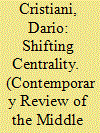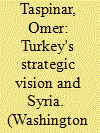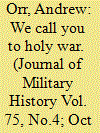|
|
|
Sort Order |
|
|
|
Items / Page
|
|
|
|
|
|
|
| Srl | Item |
| 1 |
ID:
193283


|
|
|
|
|
| Summary/Abstract |
This article examines the changing patterns in Türkiye’s strategic and military posture since the establishment of the Republic, with a focus on the developments, and changes, since the 1980s. Originally based on the two principles of deterrence and collective security, this view has later developed in other directions. In the 1980s, this posture started to shift as Türkiye became a more assertive regional player, and the domestic civilian–military balances were changing. This evolution would emerge more visibly under the AKP, as a new perception of the Turkish geographical centrality brought the country to play a pro-active regional and international role, exemplified by the emergence of Türkiye as a peacekeeping actor with an aggressive economic foreign policy. In this period, the Turkish strategic view evolved, making active engagement and forward defense two pillars of a new approach.
|
|
|
|
|
|
|
|
|
|
|
|
|
|
|
|
| 2 |
ID:
116608


|
|
|
|
|
| Publication |
2012.
|
| Summary/Abstract |
For most of the 20th century, Turkey chose not to get involved in Middle Eastern affairs. During the past decade, however, in a remarkable departure from this Kemalist tradition (based on the ideology of the republic's founder, Mustafa Kemal Atatürk), Ankara has become a very active and important player in the region. Under the Justice and Development Party (AKP) government since 2002, Turkey has established closer ties with Syria, Iran, and Iraq, assumed a leadership position in the Organization of the Islamic Conference (OIC), attended Arab League conferences, and contributed to UN forces in Lebanon. It has also mediated in the Syrian-Israeli conflict as well as the nuclear standoff with Iran. Ankara's diplomatic engagements with Iran and Hamas have led to differences with the United States and Israel, leaving many wondering if Turkey has been turning away from its Western orientation or if it was just a long overdue shift East to complete Turkey's full circle of relations.
|
|
|
|
|
|
|
|
|
|
|
|
|
|
|
|
| 3 |
ID:
116796


|
|
|
|
|
| Publication |
2011.
|
| Summary/Abstract |
In the immediate aftermath of the First World War, Mustafa Kemal and his Turkish National Movement fought to create a Turkish nation-state in the face of Allied attempts to partition the Turkish regions of the former Ottoman Empire. The struggle over the future of Turkey overlapped with the civil war which came on the heels of the Bolshevik Revolution in neighboring Russia and the assumption of control over nearby parts of the Middle East by Britain and France. Believing that events in Turkey were bound to have an impact on its attempt to consolidate control over its new imperial holdings in the Near East, the French government made a concerted effort to come to grips with the nature of the Kemalist movement. In the process, however, France's military intelligence analysts, instead of seeing Kemalism as the nationalist and secular, westernizing movement it was, chose to identify Kemal as the central figure in a communist-inspired, German-controlled anti-colonial enterprise closely allied to Islamist political movements. The French military's misunderstanding of Kemal's goals and ideology reflected intelligence officers' belief that Middle Eastern developments were essentially derivative of European politics.
|
|
|
|
|
|
|
|
|
|
|
|
|
|
|
|
|
|
|
|
|